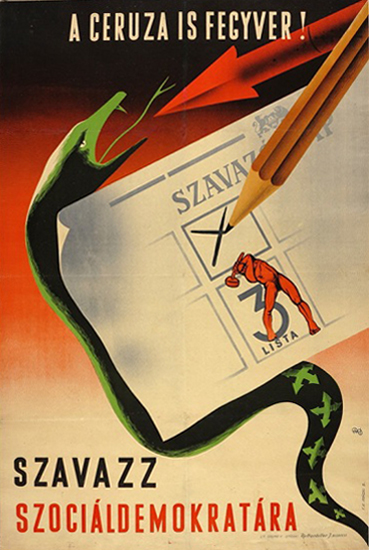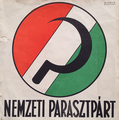
Description:
Outstanding propaganda poster, published for the 1947 elections. The poster advertised the Social Democratic Party, whose symbol was the red-hammer-wielding man (by Biró), which appears on the voting sheet. The composition suggests that a single vote can be as effective as a weapon, and defeat the Hungarian nazis (their symbol, the arrow cross, appears on the snake).
The poster was created during one of the most flourishing periods of political poster art (1945-1948).
The Hungarian parliamentary election of 1947, which later became infamously the "blue-ballot" elections, were held on 31 August 1947.
The Hungarian Communist Party, which had lost the previous election, consolidated its power in the interim using salami tactics. This fact, combined with the weakening of the opposition and a revised electoral law, led to further Communist gains. It was Hungary's last remotely competitive election before 1990.
In the summer of 1947, in the presence of Soviet arms, Hungary prepared for a new election. The Communists intended to exploit the situation that arose as a result of the disarray of their main rival, the Independent Smallholders Party, to gain a clear majority in the legislature. Their campaign's central theme was the party's national character; during the coalition years, the Communists had presented themselves as the champion of national interests and as heirs to the nation's tradition. During these preparations, two events clearly indicated the politicisation of economic issues and the economic significance of political decisions. Upon pressure from Moscow, on 10 July the Hungarian government announced its abstention from the conference that was discussing the Marshall Plan for Europe's postwar reconstruction, which, as Joseph Stalin realised, was an attempt of the United States to counter the Soviet military and political dominance of central and southeastern Europe by economic machinations. Slightly earlier, a State Planning Office was created, the three-year plan as urged by the Communists in the previous year was enacted, and on 1 August its implementation began.
It was after these further steps away from the Western democracies and towards a Soviet-type system that elections were held. They took place on the basis of a new electoral law, which excluded about 466,000 people (almost a tenth of the electorate) from the vote on grounds of membership in the pre-war fascist party; more parties participated, with only fascist ones still prohibited. In order to further guarantee success, the Communists severely rigged the elections (50,000 fraudulent votes were cast for them) but nevertheless managed to increase their vote share to a mere 22%, and failed to attain an absolute majority even with the other parties of the Left Wing Bloc. Though the emasculated and demoralised Smallholders only scored 15%, the groups that had seceded from them did well: the Democratic People's Party of István Barankovics came in second (keeping alive a real opposition and showing the strength of popular commitment to pluralism), and Zoltán Pfeiffer's Independence Party did not lag far behind the Social Democrats.
However, the Smallholders' left wing thwarted a coalition initiative from the two main opposition parties, and the old coalition remained. The manageable Smallholder Lajos Dinnyés remained as Prime Minister, and dutiful fellow travelers from the other parties were named to the cabinet for the sake of preserving the parliamentary facade. Even this turned out to be completely redundant very soon thereafter, with the gradualist approach abandoned and salami tactics accelerated. The Cominform came into being just days after the new Dinnyés government was formed. In December, Dinnyés himself was replaced by the leader of the Smallholders' left wing, the openly pro-Communist István Dobi. Intimidation, targeting of the increasingly submissive democratic parties (and absorption of the Social Democrats), nationalisation, collectivisation and other measures soon rendered the period 1945–47 a short democratic interlude, and the coalition became a mere memory a year and a half later, with the Communists wielding exclusive power.
(source: wikipedia.org)











